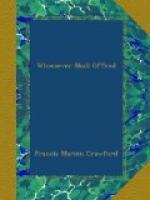“Nothing,” assented Ercole. “I thank you for your conversation. I will take a glass of the aniseed before I go, if you please.”
“Are you going already?” asked Paoluccio, as he went to fetch the bottle and the little cast glass from which he himself had drunk.
“Yes,” Ercole answered. “I go to Rome. I stopped to refresh myself.”
“It will be hot on the road,” said Paoluccio, setting the full glass down on the table. “Two sous,” he added, as Ercole produced his old sheepskin purse. “Thank you.”
“Thank you,” Ercole answered, and tipped the spirits down his throat. “Yes, it will be hot, but what can one do? We are used to it, my dog and I. We are not of wax to melt in the sun.”
“It is true that this dog does not look as if he were wax,” Paoluccio remarked, for the qualities of Nino had not escaped him.
“No. He is not of wax. He is of sugar, all sugar! He has a very sweet nature.”
“One would not say so,” answered Paoluccio doubtfully. “If you go to the city you must muzzle him, or they will make you pay a fine. Otherwise they will kill him for you.”
“Do you think any one would try to catch him if I let him run loose?” asked Ercole, as if in doubt. “He killed a full-grown wolf before he was two years old, and not long ago he worried a sheepdog of the Campagna as if it had been nothing but a lamb. Do you think any one would try to catch him?”
“If it fell to me, I should go to confession first,” said Paoluccio.
So Ercole left the inn and trudged along the road to Rome with Nino at his heels, without once looking behind him; past the Baldinotti houses and into the Via Appia Nuova, and on into the city through the gate of San Giovanni, where the octroi men stopped him and made him show them what he had in his canvas bag. When they saw that there was no cheese left and but little bread, they let him go by without paying anything.
He went up to the left and sat down on the ground under the trees that are there, and he filled his little clay pipe and smoked a while, without even speaking to his dog. It was quiet, for it was long past the hour when the carts come in, and the small boys were all gone to school, and the great paved slope between the steps of the basilica and the gate was quite deserted, and very white and hot.
Ercole was not very tired, though he had walked all night and a good part of the morning. He could have gone on walking till sunset if he had chosen, all the way to his little stone house near Ardea, stopping by the way to get a meal; and then he would not have slept much longer than usual. A Roman peasant in his native Campagna, with enough to eat and a little wine, is hard to beat at walking. Ercole had not stopped to rest, but to think.
When he had thought some time, he looked about to see if any one were looking at him, and he saw that the only people in sight were a long way off. He took his big clasp-knife out of his pocket and opened it. As the clasp clicked at the back of the blade Nino woke and sat up, for the noise generally meant food.




